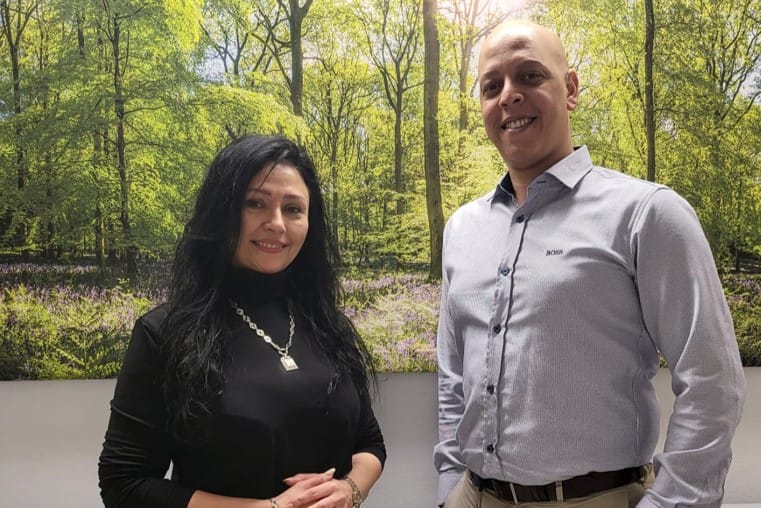60 seconds with Bilal and Saffi: International and Embassy Team
Tell us something about your role and what does a day look like for you?
Safi: My role is a mix of receiving international patients who are sponsored by the embassies or self-funding patients. The variation of the role requires good customer service and administration skills in order to maintain a smooth and good relationship between the embassies, patients, relatives and colleagues. The expectations I have for myself in my role are to help to promote our service with whatever resources we have. A typical day for me consists of liaising with patients and consultants, scheduling outpatient and inpatient appointments, organising the financial cover and supporting clinical staff with communicating with patients.
Bilal: My role kind of involves everything from A to Z with our patient’s care. I am the first point of contact with the embassies/self-payers when taking a referral where I have to deal with our referral process (referring to consultants, getting a medical opinion, treatment plan, going back to the embassy and confirming an appointment/admission). A day could be very challenging and demanding with our patients, their relatives and the embassy. With this role, the embassy expects everything to be done yesterday so you could imagine the pressure.

After two years we are starting to see the resurgence of the embassy business, what aspects are you looking forward to the most and what have you missed?
Safi: I look forward to improving our service to rebuild the business for it to reach the point where it was before the pandemic or even better! (we’ve started though). I miss the very busy environment we used to have when some days me and my team couldn’t meet each other although we were all in the same office, as each of us was busy with patients in different areas of the hospital 😊. It was melancholy when we had to clear the PPU because of Covid and seeing our patients either go home without completing their treatment or leave to another service provider.
Bilal: It was sad to witness when we had to transfer a lot of patients to different hospitals (our competitors) when we had the lockdown, so it’s a good feeling to be part of the recovery process post Covid and to bring the business back in. I look forward to rebuilding the good relationship with all middle eastern embassies and I miss the busy atmosphere and the pressure from left, right and centre 😊.
How does your team work together to contribute to the team’s deliverables?
Safi: Being organised helps a lot, and remembering every staff member’s role within the team is valuable. Happy team happy customer😊.
Bilal: Teamwork is always the way forward, we have an interpreter on the floor, a member who follows up with the Letters of Guarantees and myself and Safi deal with all the rest of the admin work. We had a much bigger team prior to Covid which made life much easier, as we are now seeing the numbers of patients come back, hopefully we are now looking to expand the team again.
Would you share some of the challenges you are facing especially in helping patients who are not accustomed to the English culture? And what are the steps you take to overcome it?
Safi: Most of our patients who come to PPU are seriously ill and don’t speak the language, so being that ill and away from home and family in a different society is so tough, hence why we make them feel at home; we help to explain and guide them in all aspects in order for them to continue their treatment journey.
Bilal: Dealing with International patients and their sponsors (embassy) is always a challenge because of the very high expectations. The most difficult is the sensitivity of this business as if anything goes wrong, we could easily lose it. We try and make our patients feel at home culture wise with the availability of all the team who speak their language.
What do you think PPU’s impact is to international patients? And where do you think we can do more to help patients access PPU and enhance their experience whilst in our care?
Safi: It’s very challenging as we have such strong competitors in the market. Sometimes we find difficulties using the facilities which cause delays in providing our service and these delays will affect our reputation badly. So, I think addressing this and looking into different aspects of our services will improve and enhance international patients’ experience as well as attract more of our target customers which of course will have an impact on the PPU revenue.
Bilal: It would be so much easier if all equipment/ theatres were available to us at an ease, as we always face a challenge to accommodate a case which sometimes makes us lose the patient to other hospitals – that could be damaging to our reputation.
What is your favourite pastime?
Safi: Short term, before the pandemic. Long term, my uni days and my work back in Egypt.
Bilal: Having a full team with the busy times.
Apart from your own, what is your favourite country to visit in the Middle East/African Continent?
Safi: Lebanon
Bilal: Oman
How would you promote the Embassy service in four words?
Safi: Challenging, engaging, enjoyable and profitable.
Bilal: Engaging, challenging, exciting and diverse.
